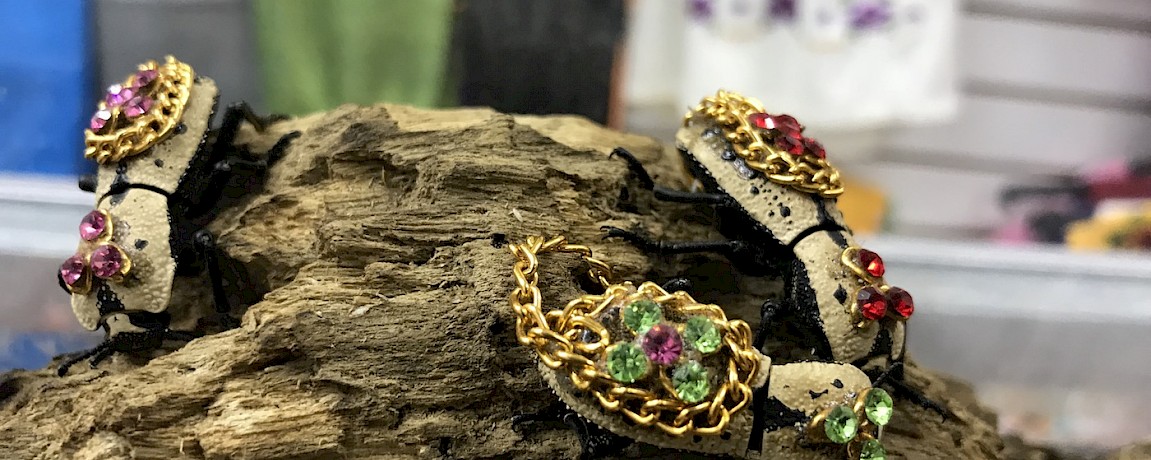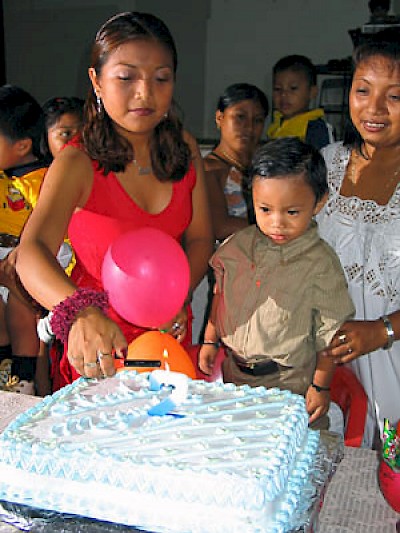What's in a (Spanish) Name?
If you aren't an aficionado of all things Mexican (which we weren't when we first moved to Yucatan), during your first few months of living here, you will meet people with names that are unfamiliar. Some of them are cute, some are funny and some are just downright odd.
Let's start with Spanish names. In our pre-Working Gringo days in California, we were familier with names like Jose, Jorge or Maria because California roots are, after all, Mexican. We suspect that perhaps many of the Mexicans we came in contact with may have adopted these more normal Spanish names to make life easier for themselves.
Upon immersing ourselves in Yucatan, we were confronted with names like Socorro, Izauro, Santiago and Ignacio... names that were definitely new to us. Some of these names (like the ones just mentioned), we found rather beautiful. Working Gringa's Spanish name is Elena, yet another beautiful name. But Working Gringo's name translated into Spanish has not been quite so painless. While "James" is a perfectly fine name in English, the Spanish version of James (pronounced "Hah-mess") is rather uncommon and not quite so pleasing. What's more, the alternative of Jaime always raises a chuckle from our Spanish-speaking friends - we're not sure why. Apparently, Santiago also means "James" and Working Gringo has found that much more amenable.
Of course, if you don't like your name, there is always the option of a nickname. Nicknames are popular here, but connections to their antecedents have not always been obvious to us. Here are some Mexican nicknames that we have run across and the "given" names that they are related to:
- Jesús (a common name here) becomes Chucho
- José becomes Pepe
- Ignacio becomes Nacho
- Socorro becomes Soco or Coco
- Maria Elena becomes Malena
- Eugenia becomes Genny (pronounced "Henny")
- Beatriz becomes Betty
- Concepcion becomes Conchi
- and so on...
Then there are the stranger dimunitives. There is a popular hardware store in the Yucatan named Boxito. From our Mayan language studies, we have learned that box means "black" and the Spanish suffix -ito means "little". As it turns out, we were right! Boxito is a nickname given to a little guy who has dark skin. It is a dimunitive name, given out of affection or familiarity, not out of disrespect. And it was probably the nickname of the man who started this very successful chain of stores. Other dimunitives in that vein are Flaco (skinny man), Gorda (fat female), Gordita (little fat female), Guera (white woman), Guapo (handsome man), Rubia (blonde woman). And of course, just change the "a" to "o" or vice-versa, and the name gets a sex change. Fun and easy!
While we're on the subject, the habit of adding dimunitives to names is a charming one and we're not sure how we lived without it before now. Mama becomes mamacita, abuelo becomes abuelito, gata becomes gatita and the list goes on ad infinitum. If you work at it hard enough, you can add -ito or -ita to almost anything and that thing is suddenly little, cute and endowed with charm and endearment. Of course, this is also used for names: Lupe becomes Lupita (at least one cafe in every town in Mexico is Cafe Lupita), Estrella becomes Estrellita, Angel becomes Angelito, etc.
But our favorites are the names we would never have thought of in a million lifetimes. Our assistant, the Amazing Beatriz, has told us about people she has met (more than one!) named Annirev. We pondered over that for a few minutes when we heard it but she finally had to tell us that it is the abbreviation for Anniversaire de Revolución (The Anniversary of the Revolution), which is the way the holiday on November 20 is often presented on a calendar.
We ourselves have met more than one young woman named Leydi Diana. All the Leydi's we have met seem to be in their early twenties... hmmm! Certainly not a coincidence.
The Amazing Beatriz also told us about a story she read in the local paper a few years back. There was a local whose name was Onecent (pronounced "OHN-neh-sent"). We puzzled over this one too but she told us not to bother. The story was that the father of Onecent had been out in the milpa (corn field) one day, and he had found a coin on the ground. On it, the coin had the letters ONE CENT and when his son was born later that day, he was so named. He could have been named Ingodwetrust ("een-gohd-WAY-troost") but that probably didn't trip off the tongue quite so lightly.
When we were researching this article, we found a story from last summer about the Mexican government cracking down on "strange" baby names, trying to save their little citizens (paisanitos?) from future embarassment in the schoolyard. Apparently, inventive names are a Mexican tradition and a custom that we think is rather endearing. Adorable. Charming. It's a customita! (Okay, so it doesn't work all the time...)
Have you heard any interesting names here in the Yucatan? Please tell us... we're fascinated!









Comments
DC 18 years ago
Great story! I have been travelling through Mexico, Central and Latin America for many years and have also heard alot of "interesting" names for just about everything from people to animals to locations. Gotta love our friends to the South.
On the note above about the name Santiago translating to James, you're right on. "Santiago" was originally referred to Saint James the Great, who brought Christianity to Spain and the Iberian Peninsula.
Later, "Santiago" became the common Hispanic reference for Saint James, the brother of Jesus.
On a more local note, in many historical references about the Texas Revolution, Colonel James Bowie is frequently called "Santiago" by the Mexican locals under his command, including Captain Juan Seguin (this was also carried into the movie 'The Alamo').
Keep the great info coming and see you soon.
Reply
Nancy Dardarian 18 years ago
I loved this post!
I have tried to figure out what my Mexican name would be, and haven't been able to come up with anything...
Would you have any idea what Nancy might be?
Thanks!
Reply
Jim E 18 years ago
Thanks for the piece about Spanish names.
I also found the Jaime version of James less euphonic than Santiago. Also read that Diego is another variant of James... in fact that Santiago = St. James or Saint Diego = Santiago.
Personally, I like Diego as my in-country monicker.
Jim aka Diego aka Santiago aka Jaime.
Reply
Mary 18 years ago
I always thought James translated as Diego. Am I wrong?
Reply
Joseph 18 years ago
My history teacher when I was in high school told us that "some dude" named his son "Masiosare" which is a misinterpreted verse from our national anthem.
There's a part where it says "Mas si osare un extraño enemigo, profanar con su planta tu suelo" which loosely means "But if a strange enemy dares to set foot on your soil".
So maybe the guy was feeling very patriotic and named his son after the "strange enemy mentioned in the national anthem, called Masiosare", because when you hear the anthem, you could hear the beginning of the verse as "Masiosare un extraño enemigo" (Masiosare a strange enemy), or maybe he was just drunk.
Poor kid.
Don't forget also:
Real name->Nickname->"Cute"(lame) Name
Enrique ->Quique ->Quiquito
Francisco->Pancho or Paco->Panchito/Paquito
Eduardo -> Lalo->Lalito
Alfonso ->Poncho->Ponchito
Alberto -> Beto ->Betito
Also, for some Nahuatl names that are a little... err.. "complex" to pronounce, you just need to say the first two morphemes.
Cuitláhuac -> Cuitla -> Cuitli
Huitzilopotztli -> Huitz -> Huitzi
And since I'm Joseph I guess that makes me... Pepeph->Pepefito right?
Oh.. not good.
Reply
« Back (90 to 95 comments)